Why Understanding Coroner Van Requirements is Critical for Death Investigation Services
A coroner van is a specialized vehicle equipped to transport deceased individuals from death scenes to medical examiner facilities or morgues. These vehicles serve as mobile command centers for death investigations, featuring refrigeration systems, body-handling equipment, and storage for investigative tools.
Key Components of a Coroner Van:
- Refrigerated storage compartment - maintains body temperature during transport
- Hydraulic lift systems - safely loads bodies weighing up to 1,000+ pounds
- Evidence storage - secure compartments for personal effects and samples
- Communication equipment - coordinates with law enforcement and medical facilities
- Biohazard containment - prevents cross-contamination and protects operators
The demand for coroner vans has grown significantly as there are over 2,000 separate jurisdictions investigating unnatural deaths in the United States. With fewer than 500 board-certified forensic pathologists serving a population that needs 1,100-1,200 autopsy performers, efficient body transport systems have become essential infrastructure.
Unlike ambulances that focus on life-saving care or hearses designed for funeral ceremonies, coroner vans prioritize evidence preservation and regulatory compliance during the critical chain of custody period.
The $283 transportation fee authorized under Government Code Section 27472 in many jurisdictions makes coroner van operations a significant budget consideration for counties and municipalities. Understanding the technical requirements and regulatory landscape is crucial for making informed purchasing decisions.
We're American Mortuary Coolers, a Tennessee-based supplier of mortuary cooling equipment with extensive experience helping coroner offices and medical examiner facilities select the right coroner van configurations for their jurisdictions. We've worked with hundreds of death investigation agencies across our service regions - from Johnson City, TN to Los Angeles, CA - to ensure their coroner van fleets meet both operational needs and regulatory requirements while staying within budget constraints.
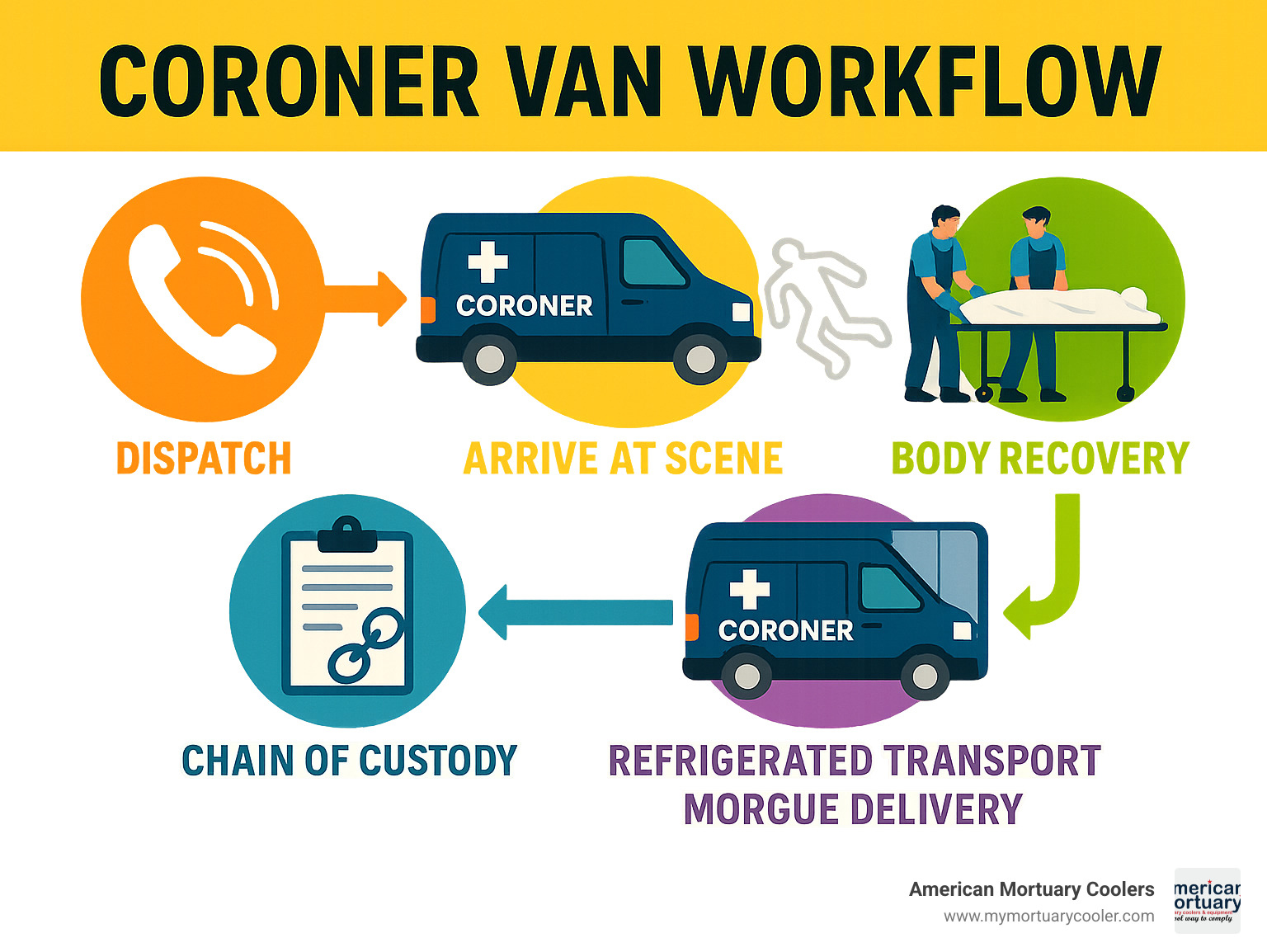
Understanding the Coroner Van's Role in Death Investigation
When someone dies unexpectedly, the coroner van becomes the bridge between tragedy and answers. These specialized vehicles respond to scenes where deaths are sudden, violent, suspicious, or unattended. Recent data shows that coroners investigated over 208,000 deaths in 2022 alone, representing about 36% of all registered deaths that year.
The moment a coroner van arrives at a scene, a careful process begins. Deputy coroner investigators work closely with law enforcement to secure the area and begin the chain of custody documentation that will follow the deceased through every step of the investigation.
What is a Coroner Van?
A coroner van is far more than a vehicle with a stretcher. It's a mobile morgue designed specifically for the respectful and secure transport of deceased individuals from death scenes to medical examiner facilities. Every feature serves a purpose in the medicolegal system.
The primary function goes well beyond simply moving bodies from point A to point B. These vehicles need refrigeration systems to preserve remains exactly as they were found, hydraulic lifting systems that can safely handle bodies weighing 1,000 pounds or more, and secure storage compartments for personal effects that might become crucial evidence in legal proceedings.
Coroner Van vs. Other Emergency Vehicles
People often ask us about the difference between a coroner van and other emergency vehicles they see on the road. The distinctions are important and tell the story of each vehicle's specialized mission.
Ambulances are built for speed and life-saving care. They're packed with medical equipment, defibrillators, and IV supplies because every second counts when someone might still be saved.
Hearses are designed for ceremony and comfort during one of life's most difficult moments. They feature neat exteriors, flower storage, and viewing windows because they're part of saying goodbye. Most hearses don't even have refrigeration.
Crime scene units share some DNA with coroner vans when it comes to evidence storage and documentation, but they lack the specialized body-handling equipment and temperature control systems that deceased transport requires.
The coroner van strikes a different balance entirely. It prioritizes evidence preservation over speed, discretion over ceremony, and functionality over appearance.
| Vehicle Type | Primary Purpose | Refrigeration | Body Lift System | Evidence Storage | Scene Discretion |
|---|---|---|---|---|---|
| Coroner Van | Deceased transport | Yes | Hydraulic/Electric | Secure compartments | High priority |
| Ambulance | Life-saving care | No | Stretcher only | Limited | Moderate |
| Hearse | Ceremonial transport | Optional | Manual/Basic | Minimal | Low priority |
| Crime Scene Unit | Evidence collection | No | None | Extensive | High priority |
Must-Have Features and Equipment Before You Buy
When you're shopping for a coroner van, certain features aren't just nice-to-have - they're absolutely essential for doing the job right. After working with coroner offices from Tennessee to California, we've learned that your coroner van needs to be part mobile morgue, part evidence vault, and part emergency response vehicle.
Refrigeration systems are your number one priority. Unlike the mortuary refrigerator units that sit comfortably in funeral homes, mobile refrigeration has to work while you're driving down bumpy roads and sitting at scenes for hours with the engine off.
Stretcher mounting systems come next - and we're not talking about the basic rails you'd find in an ambulance. These need to handle the unique challenges of deceased transport, where every movement must be secure and dignified.
PPE storage becomes critical when you're dealing with infectious disease cases or hazardous materials. Finally, emergency lighting and siren packages help you respond safely to scenes while maintaining the discretion that families and communities deserve.
Interior Layout & Body-Handling Systems
The inside of your coroner van is where the real work happens, so every square inch needs to earn its keep. Roller deck systems make loading and unloading stretchers smooth and safe - no wrestling with heavy loads or risking injury to your staff.
Bariatric capacity isn't optional anymore. With average body weights continuing to rise, your van needs to handle cases that would have been rare exceptions just a decade ago.
Many of the best coroner vans use lifting systems similar to what you'd find in funeral homes. Our funeral home body lift equipment guide covers many of these same technologies, just adapted for mobile use.
The Ultimate 1000 Lift system has been the gold standard for over 50 years. These systems adapt beautifully for van installations, giving you wireless remote operation and heavy-duty construction that safely handles up to 1,000 pounds.
Your interior layout also needs smart storage for evidence, personal protective equipment, and investigation supplies. Floor drains and antimicrobial surfaces make cleaning between cases much easier and more thorough.
Exterior & Safety Specifications
High-roof van configurations aren't just about comfort - they're about safety and efficiency. Anti-microbial surfaces throughout the vehicle help prevent cross-contamination between cases. Your HVAC systems need to provide adequate ventilation for your crew while maintaining precise temperature control in the refrigerated compartment.
Biohazard containment features include sealed flooring, dedicated waste storage, and emergency ventilation systems. These aren't just regulatory requirements - they're what keep your team safe and your community protected.
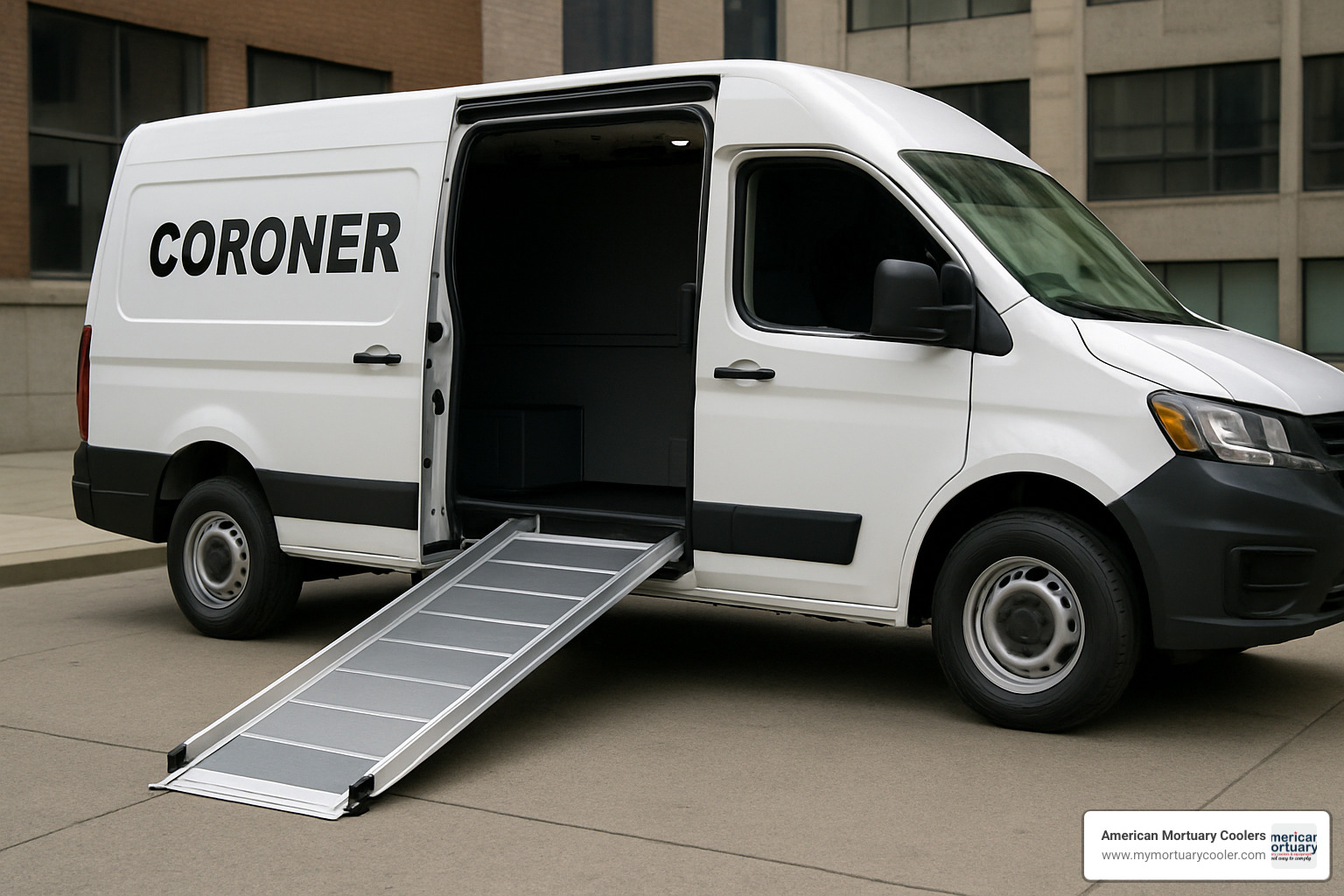
Side-loading ramps are game-changers for both safety and dignity. They reduce the physical strain on your team and allow much better positioning at crowded or tight scene locations.
Tech Upgrades & Futureproofing
Technology in coroner vans has come a long way. GPS telematics systems provide dispatch coordination, route optimization, and detailed location records that become crucial legal documentation.
Temperature data-loggers create continuous records of your refrigeration system's performance. Backup power systems ensure your refrigeration keeps running even during extended scene investigations with the engine off.
Collision-avoidance sensors and backup cameras improve safety when you're operating in chaotic environments. Communication systems need to integrate seamlessly with dispatch centers while allowing coordination between law enforcement, medical examiner staff, and family notification teams.
Legal, Procedural, and Regional Considerations
When you're operating a coroner van, you're stepping into a complex web of regulations that span from your local courthouse all the way up to federal agencies. A single misstep in following OSHA biohazard rules or missing a requirement in your state's DOT codes could compromise an entire death investigation.
U.S. Federal & State Regulations
At the federal level, your primary concerns revolve around worker safety and biohazard containment. The CDC guidelines provide your roadmap for safely handling human remains, especially when you're dealing with infectious diseases or unknown pathogens.
The United States operates with a patchwork of death investigation systems. You've got 22 states with medical examiner systems, 11 states sticking with traditional coroner systems, and 18 states running mixed systems. Each approach brings its own set of rules and procedures.
Transport fee statutes vary dramatically by location. That $283 fee we mentioned earlier under Government Code Section 27472? It's just one example of how jurisdictions handle the financial side of body transport.
Your vehicle itself must meet both standard DOT requirements for commercial vehicles and the specialized standards for medical transport. This typically includes specific performance standards for refrigeration systems, biohazard containment protocols, and emergency equipment specifications.
Driver certification requirements deserve special attention. Most states require commercial driver's license endorsements for operating these vehicles, plus specialized training in biohazard handling.
The CDC's comprehensive resources on coroner and medical examiner laws provide detailed guidance on navigating these federal and state requirements.
International Variations (UK, Australia, EU)
Looking beyond U.S. borders reveals fascinating differences in how coroner systems operate worldwide. In the United Kingdom, coroners are independent judicial officers appointed by local councils. Most are solicitors or barristers rather than medical professionals.
UK coroner operations handle approximately 208,400 deaths annually - representing 36% of all registered deaths in the country. What's particularly interesting is their average inquest adjournment of 30 weeks, creating very different vehicle utilization patterns compared to U.S. systems.
Australian coroner systems vary significantly by state, with some jurisdictions using medical examiners while others maintain traditional coroner structures. One key difference you'll notice in Australian specifications is the emphasis on four-wheel-drive capability for rural and remote area access.
The European Union brings its own complexity, particularly around cross-border transport procedures. EU regulations include specific requirements for documentation when moving remains between member countries.
These international variations highlight an important point: there's no one-size-fits-all approach to coroner van operations. Understanding your specific regional requirements is crucial for making the right equipment decisions.
Budgeting, Customization, and Acquisition Paths
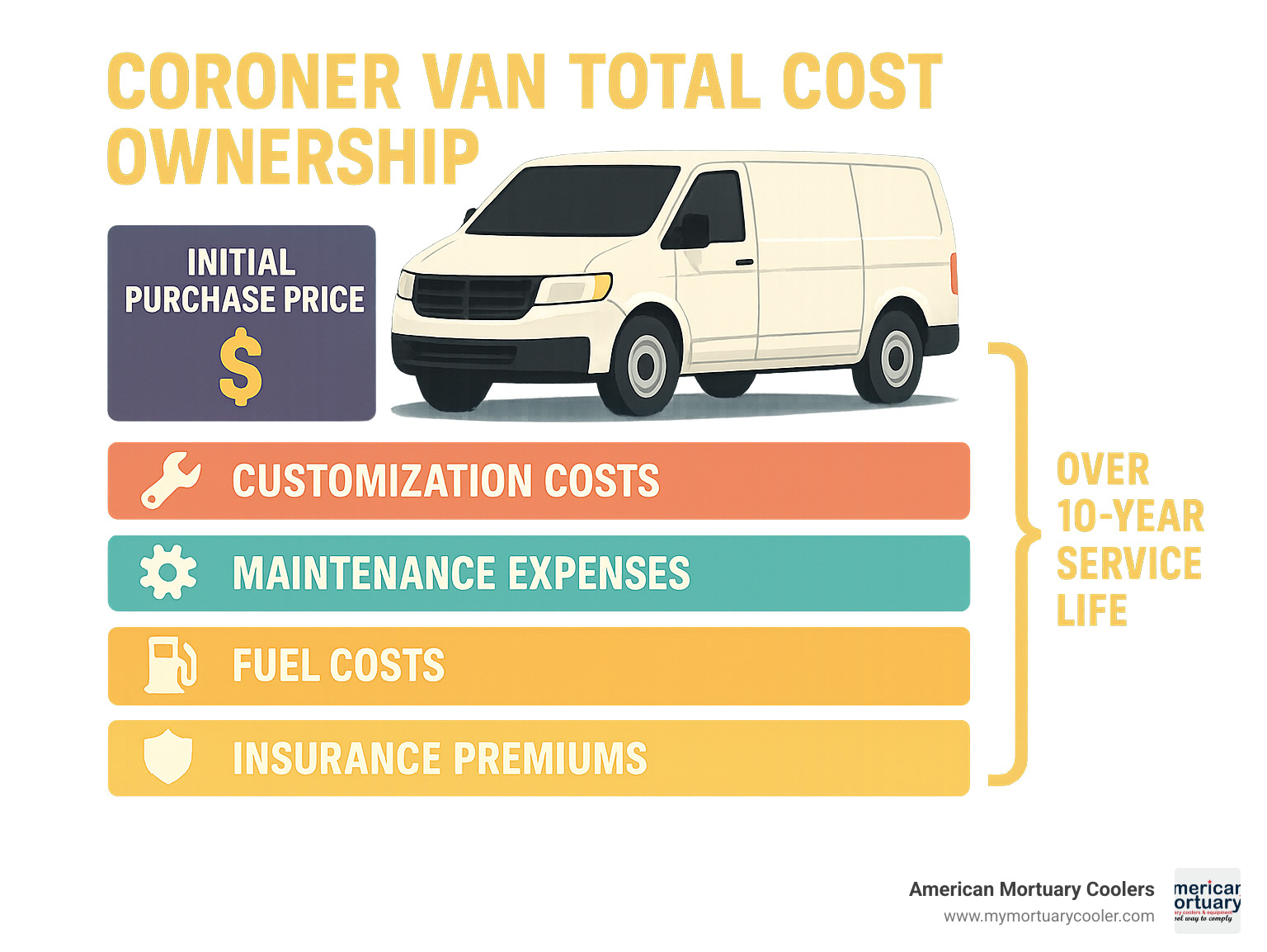
Getting a coroner van into your fleet involves more than just writing one big check. The real cost picture includes the base vehicle price, all those custom features you need, ongoing fuel and maintenance, plus insurance that covers your specific operations.
Smart jurisdictions look beyond sticker shock to understand total cost of ownership over the vehicle's lifetime. A $150,000 coroner van that runs reliably for 12 years costs far less per call than a $100,000 unit that breaks down frequently or needs major repairs after five years.
New vs. Refurbished Coroner Vans
Buying new gives you exactly what you need, built to your specifications. A properly maintained coroner van typically serves faithfully for 10 to 15 years, depending on how many calls you run and how well you maintain it. New vehicles come with comprehensive warranties that cover both the truck and all that specialized equipment.
Refurbished vehicles can save serious money, especially for smaller counties watching every dollar. The trade-off is shorter remaining service life and fewer customization options.
Call volume often determines which route makes sense. If you're running two calls per day, that new vehicle reliability pays for itself. But if you average three calls per week, a well-maintained used unit might serve perfectly. Our First Call Van Options guide walks through the decision process in detail.
Warranty coverage becomes critical for refrigeration systems and hydraulic lifts - the expensive stuff that keeps your operation running.
Custom Build Checklist
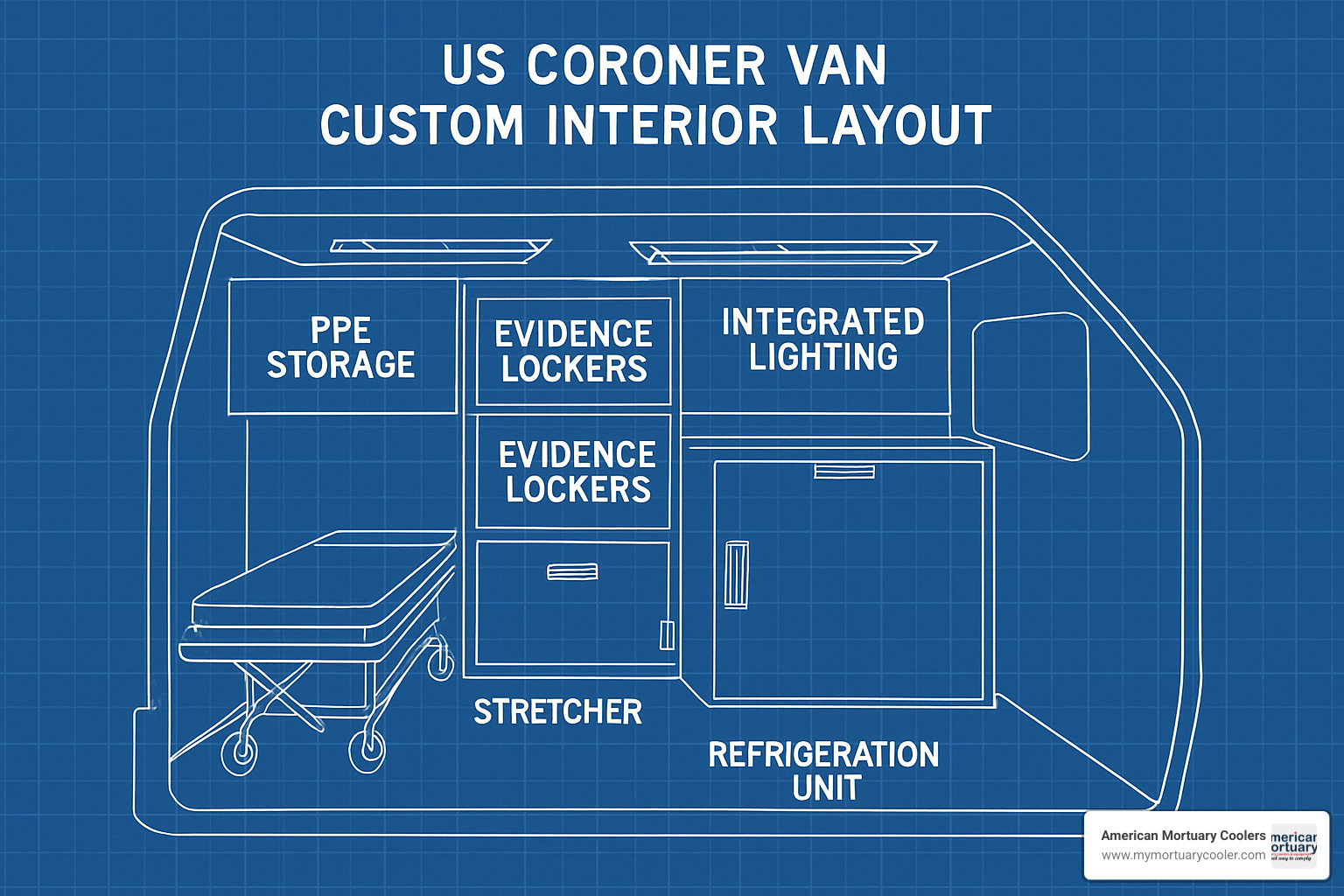
Planning your coroner van customization prevents expensive surprises and ensures you get everything you need. Floor drains aren't glamorous, but they're essential when you need to hose out the interior after a difficult case. Inverter power systems keep your equipment running when the engine's off during long scene investigations.
Scene lighting makes all the difference during nighttime calls. Storage solutions need to accommodate stretchers, investigation gear, PPE, and evidence bags while keeping everything accessible when you're working fast.
Communication equipment requires careful planning for antenna placement and power needs. Your climate control system must keep operators comfortable while maintaining refrigeration performance.
Partnership with Manufacturers & Delivery Logistics
Working with experienced coroner van manufacturers saves headaches and ensures regulatory compliance. At American Mortuary Coolers, we handle direct delivery across all 48 contiguous states, so you don't juggle multiple vendors and shipping companies.
Upfitter lead times typically run 8 to 16 weeks, depending on how complex your customization gets and current order backlog. We provide complete driver training during vehicle handoff, covering refrigeration operation, hydraulic controls, and emergency systems.
Our service network spans from Tennessee headquarters to regional offices in Atlanta, Chicago, Dallas, Los Angeles, New York, and Pittsburgh.
Operating, Training, and Maintenance
Running a coroner van successfully goes far beyond just driving from point A to point B. Your operators become the face of your death investigation system, often working in emotionally charged situations where families are grieving and communities are seeking answers.
The training requirements can feel overwhelming at first, but they're absolutely essential. Most jurisdictions require specialized endorsements for emergency vehicle operation, and biohazard handling certification is typically mandatory.
Coroner Van Operator Training
Coroner van operators need skills that go way beyond what you'd expect from a regular commercial driver. Death scene safety training protects your team from the biological hazards, chemical exposures, and physical dangers they'll encounter in the field.
Lifting techniques training prevents serious injuries. When you're dealing with bariatric cases or situations where your hydraulic lift system isn't accessible, proper body mechanics become your operator's best friend.
Continuing education requirements vary by state, but most jurisdictions expect annual recertification. Topics usually cover infectious disease protocols, evidence handling updates, and emergency procedures.
Scenario-based training exercises make all the difference when your team faces their first mass casualty event or high-profile crime scene.
Scene Coordination & Sensitivities
The coordination dance at death scenes requires careful choreography. Law enforcement controls the scene perimeter and handles evidence collection, while your coroner team focuses on body recovery and dignified transport.
Family interactions demand exceptional emotional intelligence from your operators. They're often the primary point of contact for grieving families desperate for information about their loved ones.
Media management becomes critical in high-profile cases. Your operators need to understand your jurisdiction's media policies and maintain appropriate discretion.
Professional appearance and conduct reflect on your entire operation. Clean, well-maintained vehicles and properly uniformed operators demonstrate respect for the deceased and their families.
Cleaning, Disinfection, and Preventive Maintenance
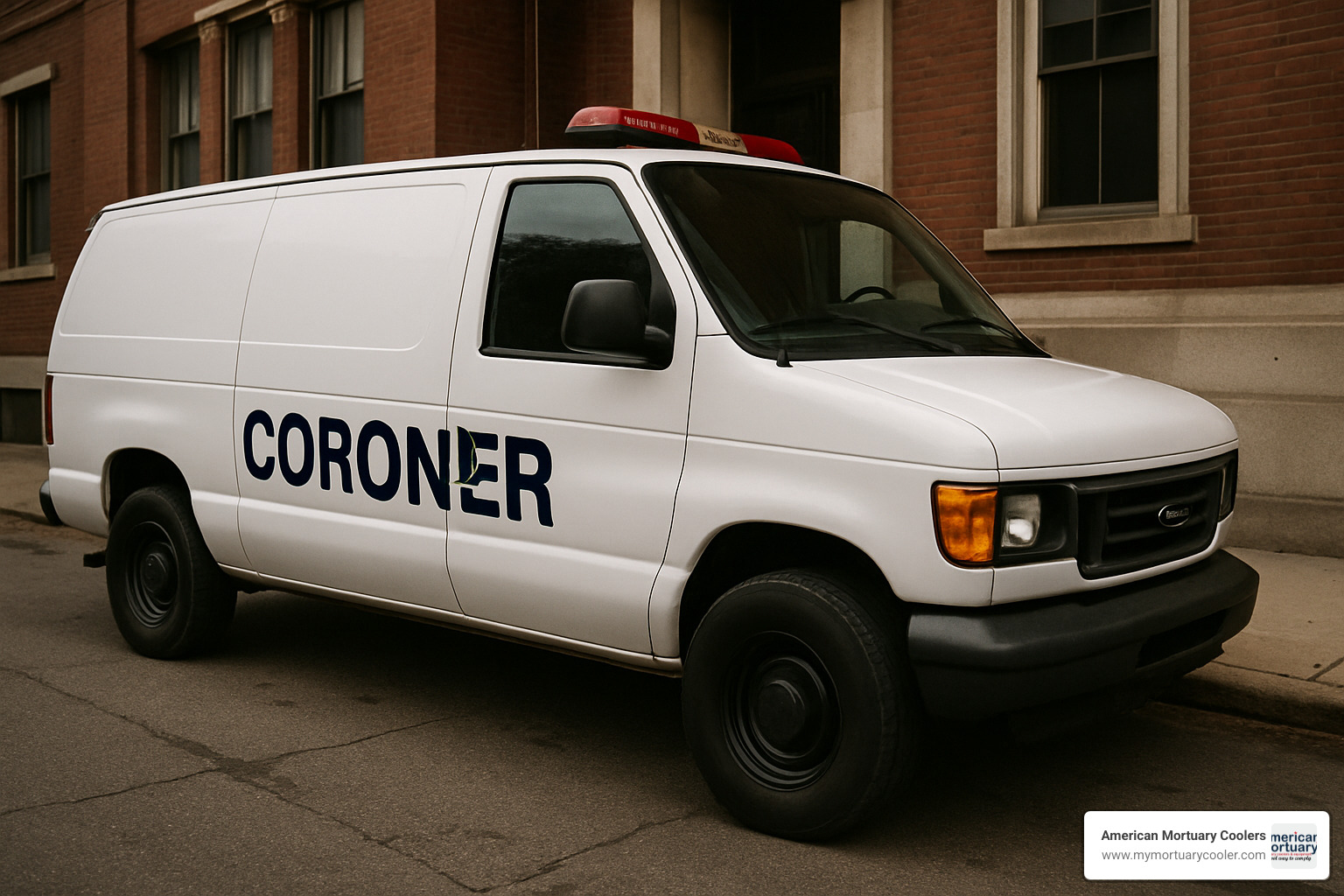
Proper cleaning protocols protect both your operators and the integrity of your investigations. EPA-approved disinfectants designed specifically for mortuary use provide effective pathogen control without damaging your expensive equipment.
Quarterly inspections catch problems before they become emergencies. Your refrigeration system deserves special attention - a failure during transport can compromise an entire investigation.
The hydraulic lift systems need regular service to maintain safe operation. These systems handle tremendous weight loads under challenging conditions, and mechanical failure can cause serious operator injuries.
Documentation of all maintenance activities serves multiple purposes. It provides important records for warranty claims, helps identify patterns that might indicate design issues, and demonstrates your commitment to proper equipment care.
Frequently Asked Questions about Coroner Vans
We get lots of questions about coroner van operations from departments across the country. Whether you're a small rural county or a busy urban jurisdiction, these three questions come up most often when agencies are planning their death investigation services.
How quickly can a coroner van be dispatched after a death is reported?
Most coroner van services aim to arrive within 2-4 hours of getting the call, though this can vary quite a bit depending on where you are and what's happening. If you're in a rural county where the van might be an hour away, you'll naturally have longer response times than urban areas where everything's closer together.
Several factors affect how quickly we can get a van rolling. Staff availability is the big one - some jurisdictions have 24/7 on-call teams, while others work regular hours with emergency callback procedures. The vehicle's current location matters too, especially if it's already out on another call.
Scene safety can also create delays. If law enforcement hasn't secured the area yet, or if there are hazardous conditions, the van has to wait. Nobody wants to put operators at risk or compromise an investigation by rushing into an unsafe situation.
Priority cases like homicides or mass casualties get immediate response regardless of the time of day. Natural deaths in attended circumstances might be scheduled during regular hours to make better use of resources - especially important for smaller departments with limited staff.
Do all coroner vans need built-in refrigeration units?
The honest answer is no, not every coroner van absolutely needs refrigeration, but most departments find it's worth having. If you're making short trips and delivering directly to a refrigerated morgue facility, you might get by without it.
But here's the thing - extended scene investigations can take hours, especially in complex cases. Long transport distances or delays getting into the morgue make temperature control essential for preserving evidence. This becomes critical when you need toxicology testing or you're dealing with infectious diseases.
Climate plays a huge role in this decision. If you're operating in hot climates like Arizona or Florida, refrigeration isn't optional - it's absolutely necessary. Decomposition accelerates quickly in heat, and you can't afford to compromise evidence integrity. Cold climates might give you some natural preservation during winter months, but summer heat is still a concern.
The cost-benefit analysis really depends on your typical call volume, transport times, and what happens if evidence gets degraded. For most departments, the peace of mind and evidence protection make refrigeration a smart investment.
What insurance coverage is required for operating a coroner van?
Coroner van insurance gets complicated because you're dealing with specialized operations and unique liability exposures. Most jurisdictions require minimum liability coverage of $1-2 million per occurrence - significantly higher than standard commercial vehicle policies.
Professional liability coverage protects against claims related to improper handling of remains or evidence. Given how sensitive death investigations are and the potential for legal challenges, this coverage becomes absolutely essential. You don't want to be caught without it if something goes wrong.
Property coverage needs to address both your base vehicle and all that expensive custom equipment - refrigeration systems, hydraulic lifts, communication gear. Make sure you get replacement cost coverage so you have adequate funds for complete vehicle replacement if necessary.
Business interruption coverage helps keep operations running if your primary vehicle gets damaged or needs extended repairs. This is especially critical for single-vehicle operations where you don't have backup options readily available.
Working with an insurance agent who understands the funeral and death investigation industry makes a huge difference. They can help you identify coverage gaps and ensure you're properly protected without overpaying for unnecessary coverage.
Conclusion
Choosing the right coroner van isn't just about checking boxes on a specification sheet. It's about ensuring your community has the tools needed to provide dignified, professional death investigation services when families need them most. The decisions you make today will impact investigations for the next 10-15 years of service life.
We've seen how the right equipment makes all the difference. When you're working a scene at 2 AM in challenging conditions, having reliable refrigeration, proper lifting equipment, and adequate storage isn't just convenient - it's essential for maintaining the integrity of your investigation and protecting your staff.
The cost-benefit analysis consistently shows that investing in quality equipment upfront saves money over time. Yes, a properly equipped coroner van represents a significant capital investment. But when you consider the alternative - compromised investigations, equipment failures at critical moments, or safety incidents - the value becomes clear.
Our single-source procurement approach takes the headache out of coordinating multiple vendors, shipping schedules, and compatibility issues. When you work with American Mortuary Coolers, you get everything from initial planning through final delivery handled by one experienced team.
From our Tennessee headquarters, we've delivered coroner vans to jurisdictions across the country. Whether you're in rural Tennessee dealing with challenging terrain or urban California managing high call volumes, we understand that every jurisdiction has unique needs.
The respectful service aspect can't be overlooked. These vehicles represent your agency's commitment to treating every case with dignity. Families notice when you arrive in a clean, professional vehicle operated by trained staff.
For additional guidance on vehicle selection and supplier evaluation, our comprehensive guide to reliable funeral vehicle suppliers provides valuable insights for making informed decisions.
If you're ready to discuss your coroner van requirements, we're here to help. Our team understands both the technical specifications and the real-world operational challenges you face. We'll work with you to design a solution that meets your needs, fits your budget, and serves your community with the professionalism they deserve.
Contact us today to start planning your next coroner van acquisition. Your community depends on you to get this right - and we're here to make sure you do.
















